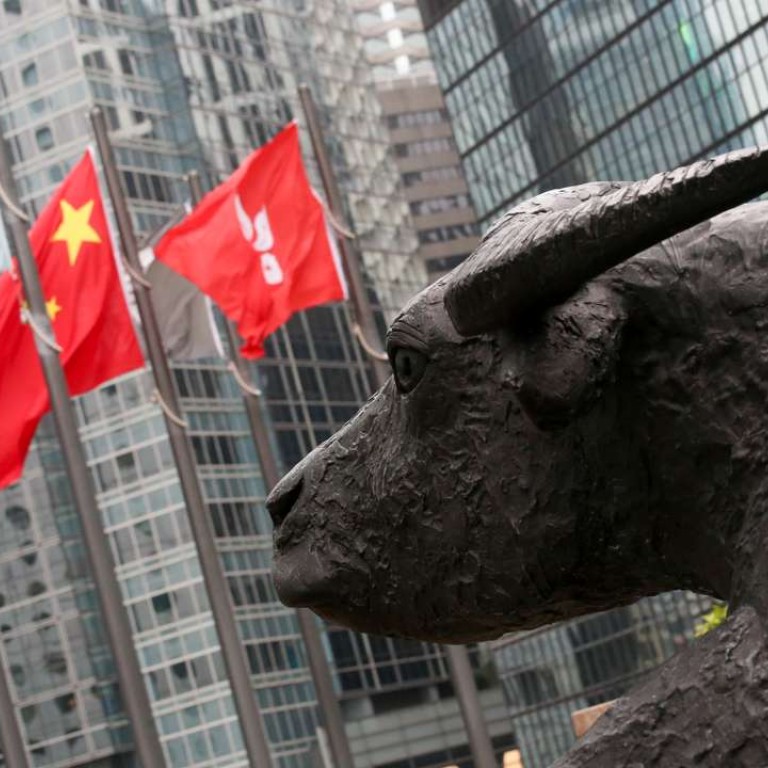
China’s A shares post biggest yearly loss in five years; Hong Kong ends 2016 up despite market turmoil
China’s stock markets rallied on Friday but failed to recoup full year losses that were the worst in five years, while Hong Kong stocks ended the year in the black despite a year that saw US interest rate rises, a slowing mainland economy and overseas black-swan events such as Brexit and the US presidential election.
Mainland China A shares recorded their biggest yearly loss in five years, following a short-lived circuit breaker system implemented at the beginning of the year and regulatory intervention in the property market.
Meanwhile, Hong Kong’s benchmark Hang Seng Index ended 2016 at 22,000.56, up 0.41 from the start of the year thanks to a 0.96 per cent rally on Friday, the biggest one-day gain in more than a month. In 2015, the index fell 7.16 per cent due to an A-share market rout.
The Hang Seng China Enterprise Index edged up 0.88 per cent to end at 9,394.87, representing a yearly drop of 2.78 per cent, extending its 19.39 per cent loss seen last year.
Trading turnover on Friday remained low at HK$53.78 billion, staying below HK$60 billion for eight consecutive days.
“Chinese funds continue their end of year window dressing whereas international funds are waiting to see the implications of Donald Trump taking over [as president] in the US,” said Andrew Sullivan, managing director for sales trading at Haitong International Securities.
All major sectors rallied on Friday, led by financial, property and mining stocks.
Chinese funds continue their end of year window dressing whereas international funds are waiting to see the implications of Donald Trump taking over [as president] in the US
Zhaojin Mining Industry ended up 5.21 per cent to HK$6.67 as gold prices surged to two-week highs. China Construction Bank, the most traded blue chip, gained 1.36 per cent to HK$5.97.
Mainland China’s major benchmarks, despite a small rally on Friday, recorded their biggest annual losses in five years.
The Shanghai Composite Index inched 0.24 per cent higher on Friday to close the year at 3,103.64 amid low turnover. 2016 has seen the benchmark fall 12.31 per cent year on year, compared with a 9.41 per cent gain in 2015. This year marks the biggest yearly loss since its 21.7 per cent fall in 2011.
Food and beverage, home appliance, banking and coal sectors were the biggest winners of the year with single digit gains on average, while transportation, property and media related stocks fell more than 20 per cent on average for the year.
The CSI 300 Index, which tracks large companies in Shanghai and Shenzhen, edged up 0.37 per cent on Friday to 3,310 and recorded an 11.28 per cent loss year on year, also the biggest fall in five years following a 5.58 per cent gain in 2015.
The Shenzhen Component Index rose 0.17 per cent to 10,177.14, ending the year with a 19.6 per cent drop, while the Nasdaq-like ChiNext plunged 27.7 per cent this year, ending at 1,962.06.
Goldman Sachs expects the CSI 300 Index could reach 4,000 in 2017, led by energy, IT and health care stocks despite the yuan’s depreciation and slower economic growth.
Best performing stocks in 2016 included Sichuan Shuangma Cement Co , whose shares at one point surged 645.2 per cent thanks to a share transfer arrangement, while Maanshan Dingtai Rare Earth & New Material jumped as much as 482.7 per cent as it became the shell for a back-door listing of SF Express, the country’s largest private courier.
Dandong Xintai Electric Co, meanwhile, was the worst performer as it became China’s first company to be delisted from an exchange for fraud committing during its initial public offering.


